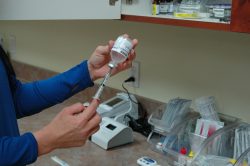Treatment for Alcohol Withdrawal in Detox Centers
Treatment for alcohol withdrawal in a detox center may not seem necessary, but it often is. Whenever someone begins to undergo withdrawal symptoms associated with alcohol dependence, they will need to attend treatment at one of these facilities because of the volatile nature of the syndrome. According to the NLM, “Alcohol withdrawal is a serious condition that may rapidly become life threatening” which is why there are many different treatments methods involved with alcohol detox.
Contact Detox.com now to find alcohol withdrawal treatment centers near you!
Medication
Pharmacological treatments are often part of what is offered at an alcohol detox clinic. Because the substance can cause severe symptoms when people who are dependent suddenly stop drinking (such as insomnia, vomiting, depression, anxiety, hallucinations, and even seizures), it is important that these are managed with medication. According to SAMHSA, benzodiazepines “remain the medication of choice in treating withdrawal from alcohol.”

Various medications are used in detox centers to help alleviate severe alcohol withdrawal symptoms.
A patient is usually given this treatment every few hours until there is some significant improvement in their condition. In some cases, the individual may need to be completely sedated if their withdrawal symptoms are extreme enough. “In general, patients with severe withdrawal may receive 20mg of diazepam or 100mg of chlordiazepoxide every 2 to 3 hours until improvement or sedation prevails.”
There are other medications which can be used in alcohol detox as well, including:
- Barbiturates
- Antipsychotics
- Relapse prevention agents
- Beta blockers/alpha adrenergic agonists
- Anticonvulsants
The use of these medications are based on an individual patient’s needs, and most are given some level of benzodiazepines. Especially if the individual is undergoing the severe form of withdrawal known as delirium tremens, they will need to receive medication right away.
Counseling
If it is possible for an individual to attend behavioral therapy or counseling during their withdrawal, it is important for them to do so. This treatment is often started as a part of detox because it helps transition patients into further alcohol rehab. As stated by the NLM, “Permanent and life-long abstinence from alcohol is the best treatment for those who have gone through withdrawal,” and this can often only be achieved with the help of some kind of counseling. Patients can expect the use of therapies such as:
- Individualized counseling based on certain techniques
- Cognitive-behavioral therapy
- Contingency management
- Community reinforcement approach
- Motivational enhancement
- 12-step facilitation therapy
- Group counseling
- Family and relationship counseling
With the help of these treatments, the patient will be able to fight their cravings more easily and change their behavior toward alcohol. They will also be more likely to continue with therapy or at least a support group program once they have been exposed to this treatment during detox.
Comorbidity Treatment
“Testing and treatment for other medical problems linked to alcohol use” is another important aspect of alcohol withdrawal treatment at a detox center. When all complications associated with alcohol abuse are treated with the condition, the individual is less likely to relapse and will have a stronger recovery.
Overcoming alcohol withdrawal takes time and specialized care which the physicians at your detox facility will also provide. It is important to understand the treatment options available to you as a part of detox, as it will prepare you for the journey ahead.
Find alcohol detox centers across the country by searching our directory, or by calling one of our treatment specialists at 800-996-6135(Who Answers?) .

